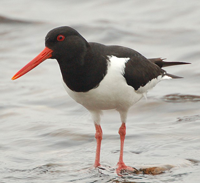 I once wisited The Wash. I was staying with a friend who worked in a hotel in Holbeach, in the South Lincolnshire area of Little Holland, and we drove up to see this seemingly unspoilt area of the Fens.
I once wisited The Wash. I was staying with a friend who worked in a hotel in Holbeach, in the South Lincolnshire area of Little Holland, and we drove up to see this seemingly unspoilt area of the Fens.I say "seemingly" because the Fens compete with the Netherlands as constituting arguably one of the most modified areas in the world. Mostly below sea level, they were once a vast flooded area with bits of land poking up, on which settlements were built: Ely Cathedral in its various forms has been called "the ship of the Fens" for over a thousand years, and it's not a metaphor.
On last night's episode of the BBC2 10-minute documentary season Coast, focu
 ssing on The Wash, local archaeologist Maisie Taylor summed up how the Fens have been seen in Britain in the past: "they were wonderful for people who lived here, but for outsiders it was an evil place". Former Professor of History and Head of Trinity College at Cambridge University (and head of the British Red Cross during World War I) G.M. Trevelyan provides a case in point in his 1944 masterpiece English Social History by quoting Elizabethan historian William Camden:
ssing on The Wash, local archaeologist Maisie Taylor summed up how the Fens have been seen in Britain in the past: "they were wonderful for people who lived here, but for outsiders it was an evil place". Former Professor of History and Head of Trinity College at Cambridge University (and head of the British Red Cross during World War I) G.M. Trevelyan provides a case in point in his 1944 masterpiece English Social History by quoting Elizabethan historian William Camden: The upper and north part of Cambridgeshire is all over divided into river isles, which all summer long afford a most delightful green prospect, but in winter are almost all laid under water, and in sIsolation, however, can have its advantages: I don't know if it's an urban myth that many churchyards dating from medieval times have mounds owing to mass graves dug to inter victims of the Black Death, but most churchyards in the Fens are flat, because they were cut off from the rest of England and often only reachable by boat.ome sort resembling the sea itself. The inhabitants of this and the rest of the fenny country (which reaches 68 miles from the borders of Suffolk to Wainfleet in Lincolnshire) are a sort of people (much like the place) of brutish, uncivilized tempers, envious of all others, whom they call Upland men; and usually walking aloft upon a sort of stilts they all keep the business of grazing, fishing and fowling.
 As Trevelyan notes, there had been plans to drain the Fens and make them more widely habitable since Elizabeth (I)'s time, with jealous eyes cast across the North Sea to Holland, whose modern name, Nederland, means "the lowland". It was eventually achieved by Dutchman Sir Cornelius Vermuyden, who was commissioned by King Charles I on the basis of his work in reclaiming parts of Essex from the sea. He oversaw the creation of artificial waterways - from ditches (one runs outside our house) to rivers - to channel water to the Wash, into which water was pumped through a series of windmills, although the job is now done electronically.
As Trevelyan notes, there had been plans to drain the Fens and make them more widely habitable since Elizabeth (I)'s time, with jealous eyes cast across the North Sea to Holland, whose modern name, Nederland, means "the lowland". It was eventually achieved by Dutchman Sir Cornelius Vermuyden, who was commissioned by King Charles I on the basis of his work in reclaiming parts of Essex from the sea. He oversaw the creation of artificial waterways - from ditches (one runs outside our house) to rivers - to channel water to the Wash, into which water was pumped through a series of windmills, although the job is now done electronically.One principle Vermuyden insisted on was that large areas of land should not be built on; they might be cultivated (Taylor refers to the Fens in Coast as "a huge growbag"), but they needed to be free from buildings so that they could absorb precipitation, so it's disturbing to learn that politicians who either dont know, or don't care about, this country's history demanding that Cambridgeshire greenbelt land be built on. Some of this land is next to us, and higher than us - even with the fields there, we sometimes get floods: should the soil and grass be replaced by concrete, we'd better buy life-jac
 kets! We were all relieved to hear the Conservatives' plans to scrap national plans and promote local decision-making in the area of house-building, as reported by Richard Normington - not due to party-political considerations, merely because not all of us can swim!
kets! We were all relieved to hear the Conservatives' plans to scrap national plans and promote local decision-making in the area of house-building, as reported by Richard Normington - not due to party-political considerations, merely because not all of us can swim! I'm a birdwatcher - albeit not a twitcher, I'm not into ticking boxes - so it was gratifying to see Coast deal with the half-million feathered friends who use The Wash as a stopping-off place each year during long migrations; I was surprised that oystercatchers, one of my favourite birds, sometimes travel from the Arctic to Africa. It was interesting to see how pla
I'm a birdwatcher - albeit not a twitcher, I'm not into ticking boxes - so it was gratifying to see Coast deal with the half-million feathered friends who use The Wash as a stopping-off place each year during long migrations; I was surprised that oystercatchers, one of my favourite birds, sometimes travel from the Arctic to Africa. It was interesting to see how pla cid the birds were when caught by a cannon-net for purposes of ringing, with ornitholigist Miranda Krestovnikoff explaining that this made the job of the Wash Wader Ringing Group so much easier.
cid the birds were when caught by a cannon-net for purposes of ringing, with ornitholigist Miranda Krestovnikoff explaining that this made the job of the Wash Wader Ringing Group so much easier.Presenter Mark Horton finished the show by saying that, due to rising sea levels, a decision would have to be made regarding whether to fight for the land around The Wash, or give it up to the sea. Businessman Peter Dawe proposed a controversial Wash tidal barrier in 2008 but it seems to have sunk without trace, although I wouldn't be surprised if it were refloated given that we now have near-idle windfarms that are killing bats and eagles.
If any of you reading this can access the BBC, I thoroughly recommend Coast as a compelling and informative series on the natural history of these islands, which at the moment do not have borders but rather coasts.











No comments:
Post a Comment
Please feel free to leave a comment - Frugal Dougal.